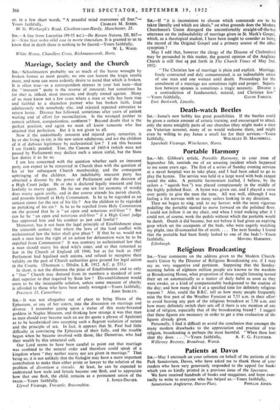Marriage, Society and the Church
SIR,—Schoolmasters probably see as much of the havoc wrought by broken homes as most people; no one can lament the tragic results more, and none can more ardently desire to mend that which is broken. It is often true—as a correspondent stresses in your last issue—that the " innocent " party is the reverse of innocent; but sometimes he (or she) is, indeed, most innocent, and deeply sinned against. ,Many of us must know not a few cases where a man or wife has been true and faithful to a shameless partner who has broken faith, lived adulterously with somebody else, and rejected repeated entreaties to return home. Divorce has followed, sometimes after years of patient waiting and of effort for reconciliation. Is the wronged partner to remain celibate, companionless, continent ? Beyond doubt that is the perfect position, and again we must all know someone who has attained that perfection. But it is not given to all.
Now if the undoubtedly innocent and injured party remarries, is he or she living in sin; is the new union adulterous, and are the children of it of dubious legitimacy by ecclesiastical law ? I ask this because I am frankly puzzled. True, the Canons of 1603-4 (which were not passed by Parliament) may declare such a union sinful, but the State law denies it to be so.
I am less concerned with the question whether such an innocent party can expect to be remarried in Church than with the question of his or her subsequent Church membership, and the consequent upbringing of the children. An indubitably innocent party has obtained a divorce by the power of Parliament and the decision of a High Court judge. He or she is declared legally innocent and free lawfully to marry again. He (to use one sex for economy of words) does marry again civilly, and in due course attends his parish church, and presents himself at Holy Communion. Is he to be regarded as an outcast sinner for the rest of his life ? Are the children to be regarded as partaking of his sin ? Is he to be repelled from Holy Communion on the ground that he is " an open and notorious evil-liver " ? But can he be " an open and notorious evil-liver " if a High Court judge has approved him and his conduct as just and lawful ? Moreover, has it not been the legal principle of Establishment since the sixteenth century that where the laws of the land conflict with ecclesiastical law the latter shall give place ? If that be so, would not such a man have the right of an action for defamation were he to be repelled from Communion ? It was contrary to ecclesiastical law that a man should marry his dead wife's sister, and so that remained as law in the Chtirch of England till 1946; but as far back as 1907 Parliament had legalised such unions, and refusal to recognise their validity on the part of Church authorities gave ground for legal action in the Courts. (Thomson v. Dibdin, L.R. 1912. A.C. p. 533.) In short, is not the dilemma the price of Establishment, and so only a " free " Church may demand from its members a standard of con- duct superior to that required by State law ? Dis-establishment would seem to be the inescapable solution, unless some measure of charity is afforded to those who have been sorely wronged.—Yours faithfully,


































 Previous page
Previous page